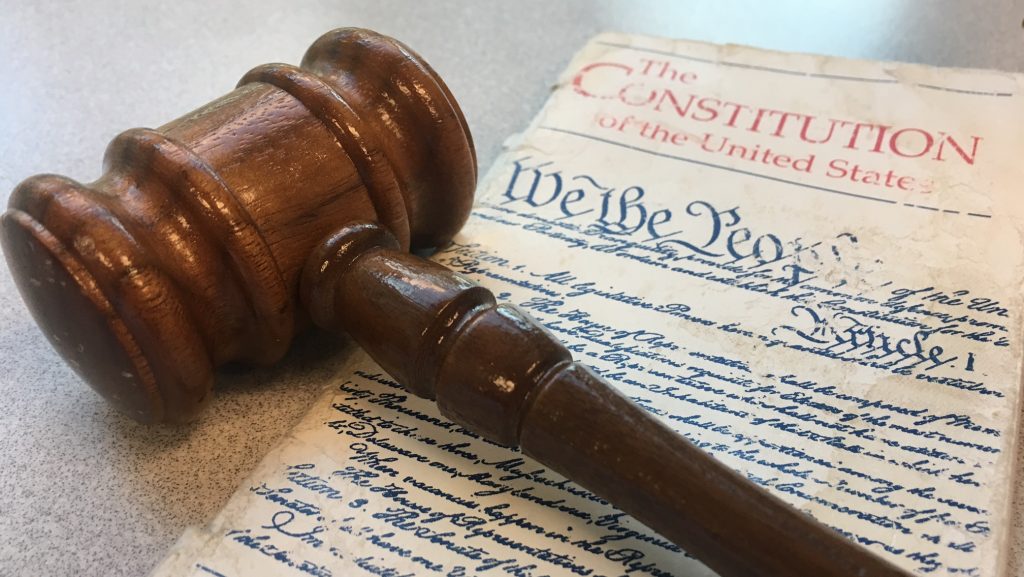#SistersInLaw Podcast Hosts Dig Into How Constitution Shapes Criminal Justice Reform
Co-hosts of #SistersInLaw podcast Barb McQuade and Kimberly Atkins Stohr discuss the Constitution’s power in framing the U.S. criminal justice system, and the ways it could guide reforms.

The first 10 amendments of the U.S. Constitution are known as the Bill of Rights.
As part of 101.9 WDET’s Book Club, we’re inviting the Detroit region to examine and discuss the text that impacts every resident of the United States: The Constitution. Whether you’re revisiting the documents or reading them for the first time, join us in reading along and engaging in civil conversations with your community.
The U.S. Constitution guarantees equal protection and due process of law for those convicted of crimes before the government can deprive them of “life, liberty or property.” However, many law experts say qualified immunity for police officers and public officials are direct contradictions to this clause. Co-hosts of the #SistersInLaw podcast Barb McQuade and Kimberly Atkins Stohr say while the Constitution has shaped many irregularities in our current criminal justice system, it also has the ability to reform them.
“The problem with equal protection is this: It assumes a race-blind system. But the reality of the world is that there are continuing racial disparities.” –Barb McQuade, #SistersInLaw podcast
Listen: Barb McQuade and Kimberly Atkins Stohr on the inconsistencies of the Constitution’s guaranteed equal protection.
Guests
Barb McQuade is a professor at the University of Michigan Law School, former U.S. attorney for the Eastern District of Michigan, and co-host of the #SistersInLaw podcast. She says there’s a disconnect between the principles of the Constitution and the human component of enforcing them. “The problem with equal protection is this: It assumes a race-blind system. But the reality of the world is that there are continuing racial disparities,” she says. Police officers have qualified immunity to protect themselves in cases of necessary extreme force, but McQuade says this policy is often exploited. “Qualified immunity just isn’t working. I think the only way to change it is through an act of Congress … I think there’s support for this not just from liberals, but also from conservatives who see this as judicial overreach.”
McQuade says the guaranteed right to be judged by a jury of one’s peers can be interpreted in different ways. “My view [as a prosecutor] was, I wanted smart jurors, because I’ve got the burden of proof,” she says. “If the jurors are confused, we lose.” She says if the jury does not reflect the community it’s judging, it can call the court’s legitimacy into question. “It’s not only important that we have a fair trial, that there’s a perception of a fair trial … You often have an all-white jury.”
“It’s a completely court-created concept … You see a real tension now about where the law stands on this issue.” –Kimberly Atkins Stohr, on where qualified immunity is in the Constitution
Kimberly Atkins Stohr is an attorney and senior opinion writer at the Boston Globe, as well as co-host of the #SistersInLaw podcast. On the question of where qualified immunity is located in the Constitution, she says, “It’s not. It’s a completely court-created concept … You see a real tension now about where the law stands on this issue.” Atkins Stohr says the entirely judicially-created rule is often used as a way to avoid judicial review in cases of excessive force. “The standard that police officers have in the use of force … is based on their perception of a threat,” she says.
Because so much of law enforcement is based on human instinct and perception, Atkins Stohr says it’s difficult to hold officers accountable without a concrete set of rules on the use of force. “One of the hardest things to prove … is intent. You have to prove the reason why someone did something.” She says to limit excessive use of force, it would be possible to override police officers’ implicit biases by “putting rules in place that really delineate objective standards.”
Trusted, accurate, up-to-date.
WDET strives to make our journalism accessible to everyone. As a public media institution, we maintain our journalistic integrity through independent support from readers like you. If you value WDET as your source of news, music and conversation, please make a gift today.
